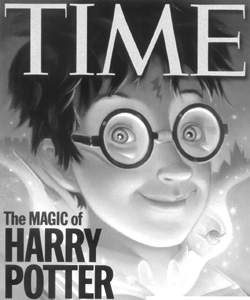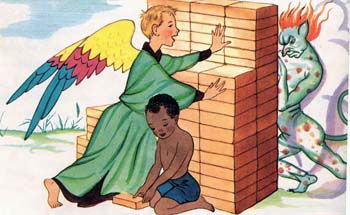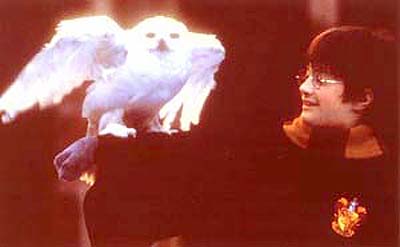 |
Cultural
Harry Potter &
the Problem of Good and Evil
Marian T. Horvat, Ph.D.
One of the greatest problems of the Harry Potter craze, as I see it, is the tremendous confusion between good and evil it is bound to generate among the youth, especially in the already-relativized ambience of our days. Children not only need absolutes, but seek them.
 When I was young, I had a vivid image of the devil in my mind, taken from the illustrations of the Wupsey story in the Catholic Treasure Box magazine. Wupsey was the guardian angel of little Sunny at the mission of Mantuga.
When I was young, I had a vivid image of the devil in my mind, taken from the illustrations of the Wupsey story in the Catholic Treasure Box magazine. Wupsey was the guardian angel of little Sunny at the mission of Mantuga.
The devil was clearly evil with his red spots, forked tail, flaming tongues of hair and cloud of sulphuric smoke that trailed him like a shadow. The crafty demon was always plotting some evil against Sunny or tempting him to try some forbidden fruit, but it was the power of the good angel that always triumphed.
This type of image made the demon very real for me – and even terrifying at times. Further, it instilled a healthy fear of anything associated with Satan or his work – including witches, wizards, spells, charms and séances. At the same time, I had the firm confidence that my guardian angel was much more powerful and that, if I had recourse to him in my fears in the dark night, he would always defeat the wiles of Satan. A simplistic vision, perhaps, but a very healthful one.
It is this innocent and sound vision of the world that was threatened with the entrance of fictitious “good” witches and “good” magic - first Samantha, then the popular Sabrina the Teenage Witch and Buffy the Vampire Slayer. It seemed possible - at least in the minds of many impressionable youth, even Catholics - to be both good and a witch.
And now, lest white magic be accused of favoring the weaker sex, we have Harry Potter, the hero of the best-seller series by English author Joanne Rowling. Harry Potter, an 11-year-old orphan raised by abusive relatives, just happens to be a wizard. A good wizard, mind you. He is kind, generous, shares and stands up for what is right, his official Website proclaims. There are some problems like foul language and youthful disrespect, but nothing too strong for our street-smart modern children, certainly. Quite surprisingly, even a Catholic “conservative” magazine such as Crisis, edited by Mr. Deal Hudson, has given a seal of approval to the “reading revolution” the Harry Potter series has generated among the youth. A vicar in the Church of England held a special “Harry Potter family service,” complete with wizards, pointy hats, and broomsticks. Apparently, today’s children are too sophisticated to become confused by the use of symbols associated with evil. They can distinguish good wizards from bad ones.

Wupsey, the guardian angel, protected little Sunny from the evil designs of the devil |
However, according to Catholic teaching, good wizards do not exist. There are no good spirits other than angels; there are no evil spirits except demons. The popular claim today is the practice of “white magic.” In current terminology, “white magic” means to take away spells and use the “powers of darkness” for good (an oxymoron if there ever was one), while “black magic” is to cast spells for the sake of evil. This notion is quite widespread. However, in reality “white magic” is all kinds of enchantments made without a direct appeal to the devil, and “black magic” is when the dependence upon Satan is explicit. It is not difficult to see. As Fr. Gabriele Amorth clearly states in his best-selling book An Exorcist Tells his Story (Ignatius Press, 1990), there is no essential difference between “white” and “black” magic. Every form of sorcery is practiced with indirect or direct recourse to Satan.
It is a well-known maxim that where religion regresses, superstition progresses. Today we are seeing a proliferation of the occult, spiritism and witchcraft, a surge of interest among youth in dangerous occult links and the dark side of “witch-power.” The association of rock music with the occult and Satanism is well-documented (see Michael Matt’s new book, Gods of Wasteland). We are witnesses of horrific crimes with satanic hues committed by teen-agers and even 11-year-olds. At the same time, there are many people – including Catholic priests and theologians – who discount not only the extent of Satan’s influence upon human affairs, but Satan himself. If there is no Satan, then surely, there’s no harm in a little magic or sorcery.
“Those modern theologians who identify Satan with the abstract idea of evil are completely mistaken,” says Fr. Amorth, one of the world’s best-known exorcists, who knows from experience that the devil really exists. “That is true heresy; that is, it is openly in contrast with the Bible, the Fathers and the Magisterium of the Church.” And, he adds, it is obvious that this belief facilitates the work of the rebellious angels.
This attitude - which makes light of sorcery, charms and spells - permeates the Harry Potter novels. Father Amorth, however, makes it quite clear that in this realm even the apparently most indifferent things are bad. There is a universal allure to have hidden power over things and persons – be it the ability to tongue-tie an English teacher or concoct a love potion. However, what starts as fun and jokes can end in a horrendous reality. Fr. Amorth seriously notes that the most common way a person can suffer blamelessly from powers of evil is through sorcery. Sorcery also is the most frequent cause in those who are struck by possession or other evil influences. Yet sorcery is presented in Harry Potter books in a lighthearted and ingenuous way. Parents who believe their children will never be tempted to dabble in the black arts that make Harry so successful and popular seem as naive as the churchmen who refuse to believe in sorcery.
Curses are another reality presented without the necessary distinctions that Catholics always learned. Actually, there are curses that are holy. These come from God for instance, God’s curse upon the Serpent in the Garden of Paradise. But it is quite clear that the curses in the Harry Potter books are not of this type. On the Harry Potter website, one can find a list of spells used in the series, some that seem indifferent enough: the Alohomora - the door-unlocking spell, or the Tarantallegra - the dancing spell. But then there is the Avada Kedavra - the killing curse (an Unforgivable Curse), and the Crucio! - a painful curse. Or the Imperio - a curse of total control. These kinds of curses have a very simple definition for Catholics: to harm others through demonic intervention. Scripture forbids these practices, because they are a rejection of God and a turning toward Satan: “There shall not be found among you anyone who burns his son or his daughter as an offering, anyone who practices divination, a soothsayer or an augur, or a sorcerer, or a charmer, or a medium, or a wizard, or a necromancer. For whoever does these things is an abomination to the Lord.” (Dt. 18: 10-12) I could cite many other verses.

Harry Potter - not so innocent or harmless |
What I fear the young reader of Harry Potter novels will not realize is that such curses invoke evil - and the origin of all evil is demonic. Further, Fr. Amorth reminds us, “When curses are spoken with true perfidy, especially if there is a blood relationship between the one who casts them and the accursed, the outcome can be terrible.” He gives many frightening examples.
Spell (also known as malefice or hex) comes from the Latin male factus – to do evil. Spells can be cast, for example, by mixing something into a victim’s food or drink. They are real, Fr. Amorth insists, he has done many exorcisms to free people from just such spells. Their evil efficacy lies not so much in the material used itself as in the will to harm through demonic intervention. Yet it is this demonic intervention that the Harry Potter novels nefariously ignore.
Magic is presented as a funny thing, a game. Spells are “cool.” Books are being published on the subject, such as Spells of Teenage Witches, described by its author as “a self-help book for young people.” A witch and officer of the Pagan Federation wrote The Young Witches Handbook, which includes spells for passing school exams or attracting a partner. Apparently there is no reason for concern. No one talks about the fact that what starts as silly spells can lead to spiritual and psychological damage, and even demonic obsession or possession.
What is most dangerous about the Harry Potter novels? It is precisely this: they don’t appear dangerous. Harry Potter and his friends cast spells, read crystal balls, and everything is fine. The author takes very serious matters that the Catholic Church has always condemned and cautioned her children to stay far away from – magic, charms, spells, sorcery, palm-reading, Ouija boards, etc. – and treats them in a trivial, and even jesting fashion. In today’s climate, charged with invitations to experiment with the occult, it is too much to open the door even an inch to the Prince of Darkness, “who prowls about the world seeking the ruin of souls.” Books that make sorcery and spells and charms seem so amusing and harmless are deceitful. At best, they certainly encourage children to take a smilingly tolerant New Age view of witchcraft. In my view, already that is too much.
Non liceat Christianis to even dabble in magic or sorcery, says St. Thomas Aquinas:
“Man has not been entrusted with power over the demons to employ them to whatsoever purpose he will. On the contrary, it is appointed that he should wage war against the demons. Hence in no way is it lawful for man to make use of the demons’ help by compacts - either tacit or express” (II-II; q. 96, a. 3).
I find it lamentable that the exorcism was taken out of the Baptismal ritual, and almost criminal that the St. Michael the Archangel prayer, which used to be recited after every Mass, has been eliminated after Novus Ordo Masses. And I think there will be many mea culpas to be made by those sophisticated parents who find critiques like this of the Harry Potter series “just too serious,” even when the author herself is warning them that her works will become increasingly dark and potentially disturbing.
It is necessary to consider that even the innocent souls of children, under the influence of this kind of darkness, without habitual recourse to the Faith and the assistance of grace, can lead in the near or distant future to serious disorders and horrendous crimes. As I consider the series of adventures of Harry Potter, which presents sorcery and all kinds of spells and divinations as normal, I am reminded of the condemnation made by the prophet Isaiah: “Woe to those who call evil good and good evil, who put darkness for light and light for darkness.” (5:20)

|
Formation | Cultural | Home | Books | CDs | Search | Contact Us | Donate

© 2002-
Tradition in Action, Inc. All Rights Reserved
|
 |

|